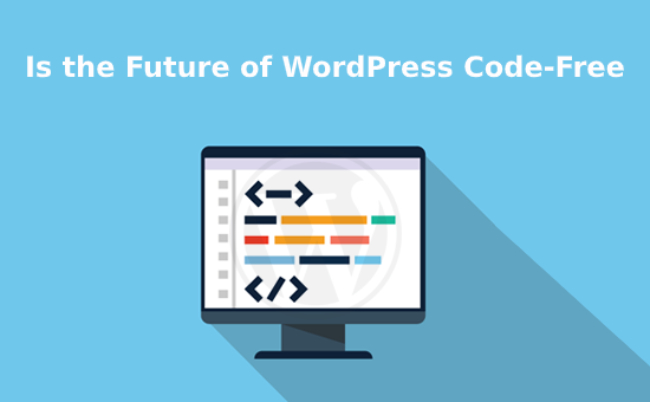
Since its inception, WordPress is serving the users amazingly in case of developing their own website. The most fascinating part is that it allows you to use it as per your needs. You can build a website, redesign it, customize the widget, etc.
Presently, the platform offers users to design a theme using scratch. It also allows you to install and activate loads of premium and free options.
Additionally, if you wish, you can thoroughly attain the benefit of the page builder plugin tool and Gutenberg block editor tool to add or format the content. With the steady evolution of the WordPress platform, the possibility of the future of WordPress code-free is high.
Even if this wonder happens, undoubtedly there would be some consequences. For having a clear concept about the procedure, continue reading.
Table of Contents
Enhanced Page builder tools
As mentioned earlier, the platform of WordPress is gradually developing so do its plugin tools and themes. Previously, the tools used to be poor and the users need to avail of these products with the knowledge of PHP and CSS to form a custom layout.
In most of the cases, the professional designers could be unconcerned of these page builder tools.
At that time, in terms of codes, those tools were highly recognized. Over time, the creators of the plugin tools have worked on their improvement.
By the time, it cannot be surely stated whether the future of WordPress code-free. However, modern tools have reached that certain position where the code has become more approachable and comprehensible.
Moreover, while a page builder is deactivated, the formatting of the content might get plundered, but the chances of displaying the enormous amount of the unexploited shortcodes are gone.

The default installation of the Gutenberg blocks
Today, for the urge of creating content, WordPress has become more visually-oriented. The Gutenberg block editor was first implemented in WordPress 5.0.
During that time, the editing tool tended to provide an additional steady user experience. This was actually a response to the custom-made techniques that are used by the website developers to overcome the restrictions of the Class Editor.
In addition, it also indicated that users do not require writing the custom codes to utilize custom features, layouts, and templates. It might be a sign that the future of WordPress code-free.
It is important to mention that the editor of the tool has generated a fresh custom block ecosystem, which can be used as per your requirements.
However, the Gutenberg editing tool is not really a direct opposition to the page builder plugin tools. It still works as an amazing alternative.
Moreover, due to the vast availability of the blocks, it is expected that a great number of editors will stick by this inbuilt editing tool.
According to the experts, sooner or later the block editor will permit editing the entire site. It refers to the fact that along with content creation, the users can smoothly create a full website with a default WordPress installation.
In fact, it thoroughly signals the future of WordPress code-free as code will become optional.
Advantages and the drawbacks
Right in the introduction part, it has been clearly mentioned that if the future of WordPress code-free, there have to be some ramifications. So, let’s check out the upsides and the downsides of the code-free WordPress site formation.
Upsides
Both the Gutenberg editing tool and page builder tool offer the users to build the convention page layouts.
Besides, these tools help in adding complex contents like navigation, post listings, image galleries, and so on. In fact, you can do all these things with just a few simple clicks, drops and drags.
Furthermore, if WordPress become code-free, the developers can accomplish a reliable building and formatting experience.
The popular tool called WordPress customizer is responsible to control some of the tasks while the other might not. Therefore, to design a site, the developers have to switch between different UIs.
When the page builder or the Gutenberg editing tool is utilized in the amalgamation of a well-matched theme, creating an entire custom site becomes possible.
Further, it can help you to compete with other DIY website developers. The constant development of the Gutenberg editing tool is an impending turning point in the present scenario.
Due to evolution, there is no place for backward and forward interfaces. With the advanced tool, the users could make use of the singular UI for all the tasks that are related to design and layout.
Downsides
Though the numbers of positivity are high with the code-free future of WordPress, there are a few drawbacks as well. The prime among all is the autonomy of the non-technical users in the industry.
They can even choose to disable the items in the custom-built theme so that the clients could not touch it. This challenge can only arise if visual UI becomes prominent.
The second challenge that can arrive with the future of WordPress code-free is the limitation of accessing a particular theme. It is because the task the custom codes are responsible for providing uniqueness to the website theme.
Moreover, it could also demoralize the website developers to play with the codes and gain in-depth knowledge for learning JavaScript, PHP, and CSS.
Final Thought
Well it is true that WordPress will eventually become a visually-oriented design platform. At first when the Gutenberg editing tool and the WordPress customizer had come into practice, the primary goal was to accomplish several design-related without incorporating any code.
Owing to the advanced CMS back end, the process of developing the WordPress site is changing as well. However, according to the estimation, WordPress is expected to become partially code-free and a little bit of JavaScript, CSS, etc will always remain a part of the website development method.
However, if you do not want to rely on coding and proceed with the designation alternatively, you can primarily avail of the interactive plugin tools. In fact if WordPress becomes code-free a lot of people will possibly get the chance of establishing their profession as a code-free designer.